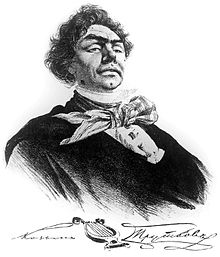Kosma Prutkov

Kosma Petrowitsch Prutkow ( Russian : Козьма Петрович Прутков) is a fictional Russian writer. The dates given are: * April 11, 1803; † January 13, 1863. The works ascribed to him were written by Alexei Tolstoy (a cousin of the better-known Lev Tolstoy ) and his two cousins Alexei and Vladimir Schemchuschnikow . Another Shemchushnikov brother ( Alexander ) and Pyotr Yershov also worked on individual texts .
Of the parodistic and literary critical texts that were published under the collective pseudonym 'Kosma Prutkow' in the 1850s and 1860s, especially in the Sovremennik , it is mainly the aphorisms that are known today . The true authorship behind the pseudonym was puzzled by contemporaries for a long time - it was only revealed in 1884 in the preface to Prutkov's Collected Works .
Career
In the above-mentioned text on the Collected Works , written by Alexei and Vladimir Schemchuschnikow, you can find information on Prutkov's most important life stages. In 1820 he entered the military and became a hussar . On the night of April 11, 1823, he had an intense dream that prompted him to quit army service and instead become a civil servant. For almost 40 years, until his death, he then worked in the Ministry of Finance, in the state probationary chamber.
After his chance acquaintance with Alexei Tolstoy and the Shemchushnikov brothers they persuaded him to try his hand at a dramatic writer. For the first time Prutkov appeared publicly as the author of the comedy Fantasy , which was performed on January 8, 1851 at the Alexandrinsky Theater in St. Petersburg. The present Tsar Nikolai I left the theater indignantly because of the absurd plot, whereupon the play was immediately canceled. The comments of a tsarist censorship official who couldn't do much with the play, but nevertheless indiscriminately improved expressions here and there, have been preserved and were adopted in later editions of the play.
In addition to other shorter plays, pompous parody poems and fables were published under Prutkov's name from 1853 to 1854 and again from 1860 in the magazine Sowremennik . The aim of the satire is partly recognizable, but: "It is not always possible to find a specific model for Kozma Prutkov's parodies: his texts are often examples of pure, self-sufficient nonsense literature."
In 1863, Prutkov's death was reported in the same journal. Some texts from the estate were added to the "obituary", including a. the fragment of his state-political paper On the introduction of a unified thought in Russia . In 1884 the Collected Works were finally published, which contained a résumé of the civil servant and clerk Prutkow. The tape also revealed the true authorship behind the collective pseudonym. The collected works experienced several reprints.
Translations into German
Peter Urban has translated some of Prutkov's texts into German, including the two pieces The Careless Turk, or: Who likes to be a grandchildren? and the interaction of earthly powers . He has also translated Prutkov's essay On the Introduction of Unified Thought in Russia and his aphorisms. Issue 90 of the literary magazine Schreibheft , published in February 2018, contained a focus on Kosma Prutkow with u. a. Texts from the translating estate of Peter Urban, compiled by Norbert Wehr .
Fruits of reflection
The more than 200 traditional aphorisms of Prutkov - the fruits of reflection - consist of pointed banalities and nonsense written in the style of an official. Many of them have entered the Russian language treasury. Some examples (in Urban’s translations):
- "The engagement ring is the first link in the chain of married life."
- "Nobody hugs the immeasurable."
- "The zealous doctor is like a pelican."
- "The genius is like a hill rising above the plain."
- "If you want to be happy, so be it."
- "Even the oyster has enemies!"
Works
Pieces
- Fantasy , 1851
- Silk lace , 1852
- A dispute between classical Greek philosophers over the beautiful , 1854
- The craniologist, that is, phrenologist , 1860
- The careless Turk, or: who likes to be a grandson? , 1863
- The interaction of the earthly powers , 1884
Others
- On the introduction of unified thinking in Russia , 1863
Translations
- The interaction of earthly powers. Mystery in eleven appearances. In: Mistake of Death. Russian absurd from 2 centuries. Edited and translated from the Russian by Peter Urban . Frankfurt / Main: Verlag der Autor 1990. pp. 61–70.
- The careless Turk, or: who likes to be a grandson? Ibid, pp. 71-79.
- About the introduction of unified thinking in Russia. Translated from the Russian by Peter Urban. In: Writing book 90 (February 2018), pp. 5–7.
- Fruits of reflection. Thoughts and aphorisms. (Selection.) Ibid, pp. 11-22.
Web links
- Literature by and about Kosma Prutkow in the catalog of the German National Library
- Facsimile of the 6th edition of the collected works (1898)
Individual evidence
- ↑ Adrian Wanner: Kozma Prutkov. On the story of a literary mystification. In: Writing book 90, pp. 8-10, here p. 9.